(2015聚焦中考 )2015中考英语复习精品课件:第3讲 七年级下Units1-6(共59张PPT)
文档属性
| 名称 | (2015聚焦中考 )2015中考英语复习精品课件:第3讲 七年级下Units1-6(共59张PPT) | 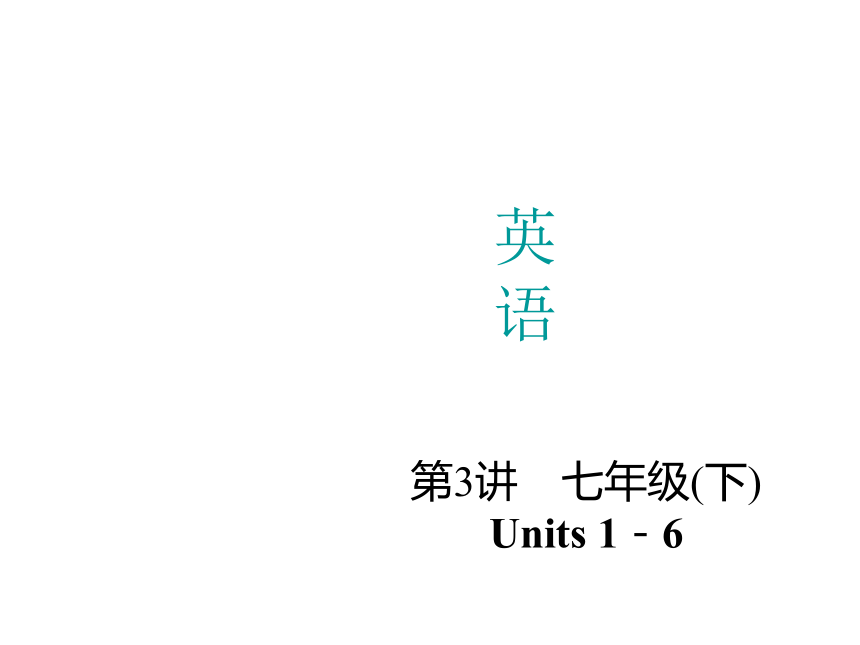 | |
| 格式 | zip | ||
| 文件大小 | 375.6KB | ||
| 资源类型 | 教案 | ||
| 版本资源 | 人教新目标(Go for it)版 | ||
| 科目 | 英语 | ||
| 更新时间 | 2014-12-18 23:41:03 | ||
图片预览

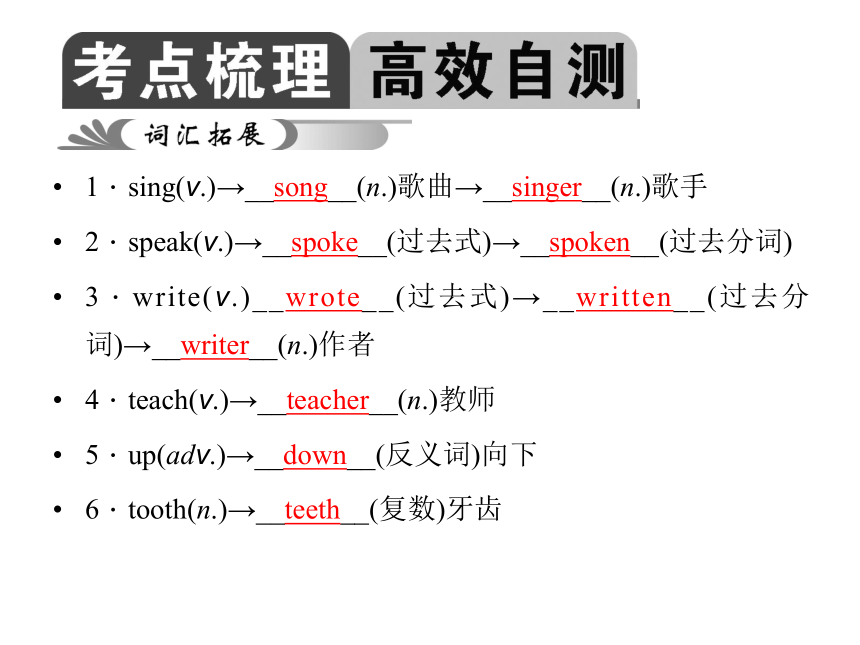
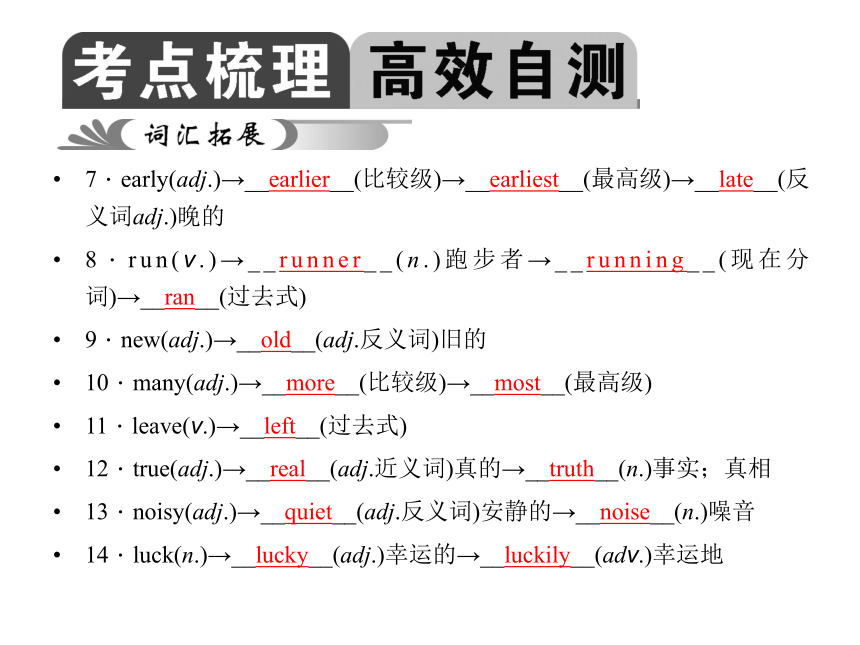
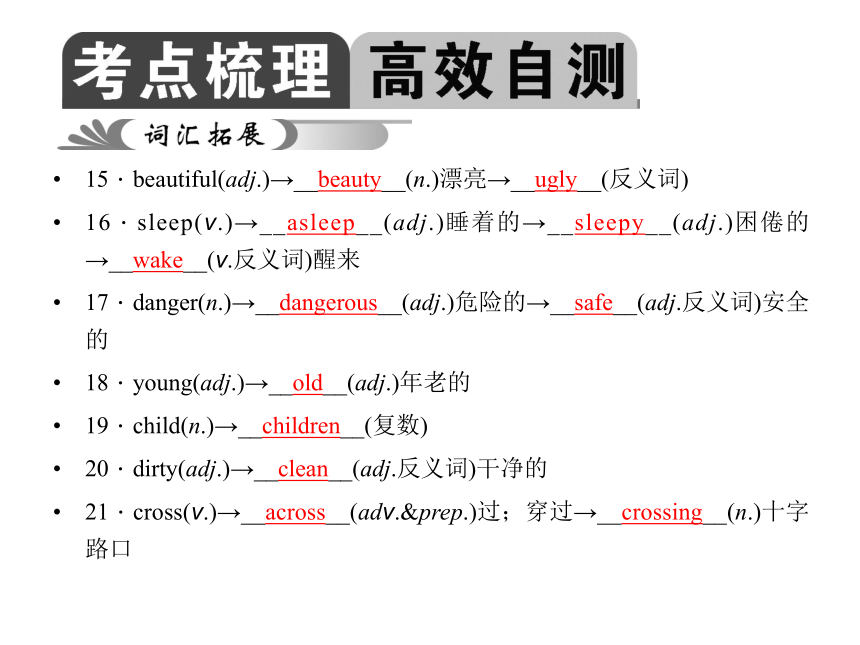


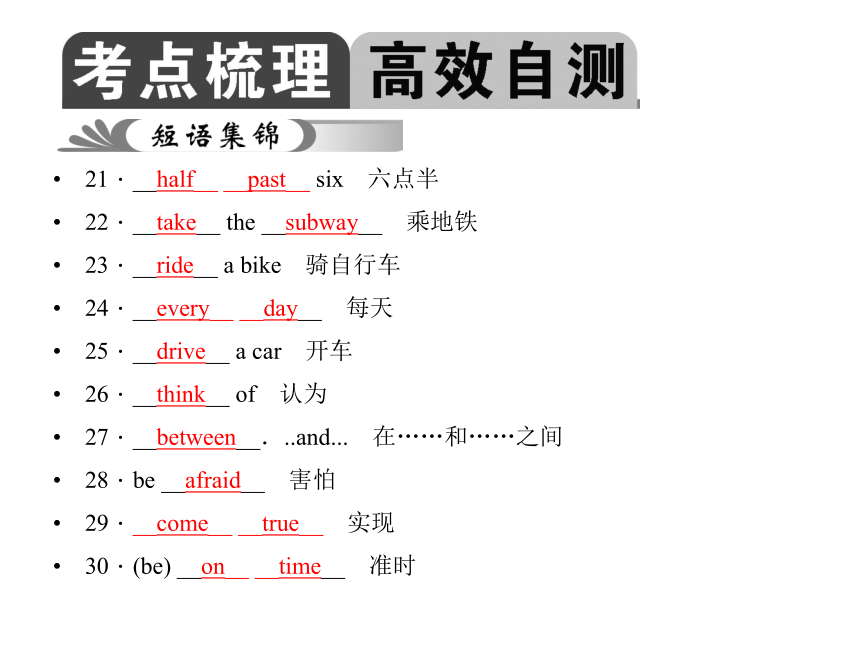

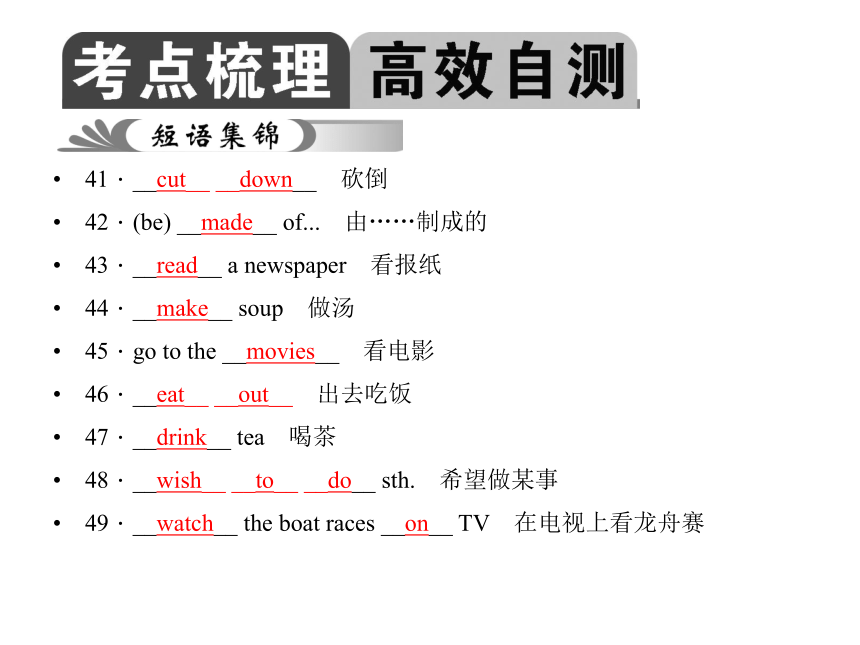

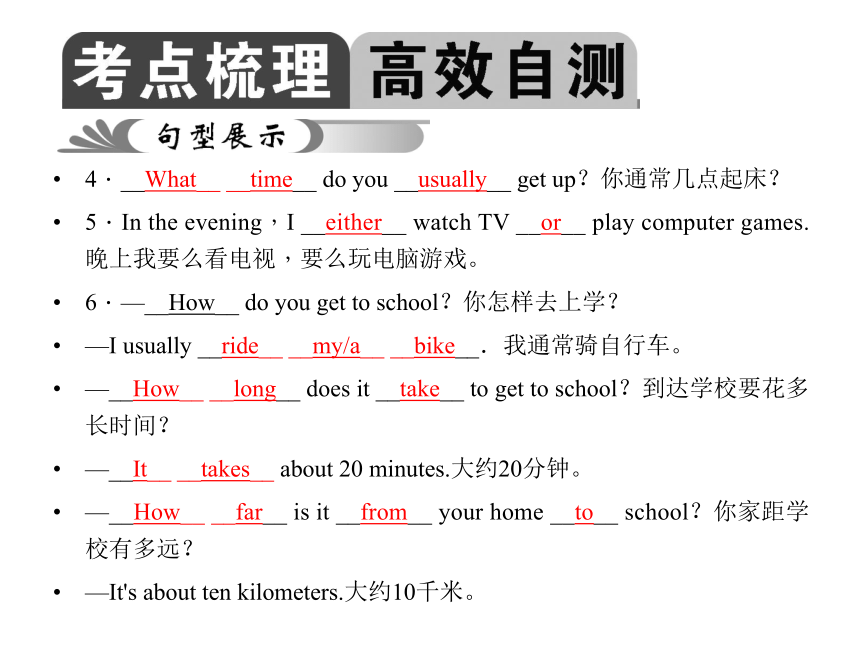
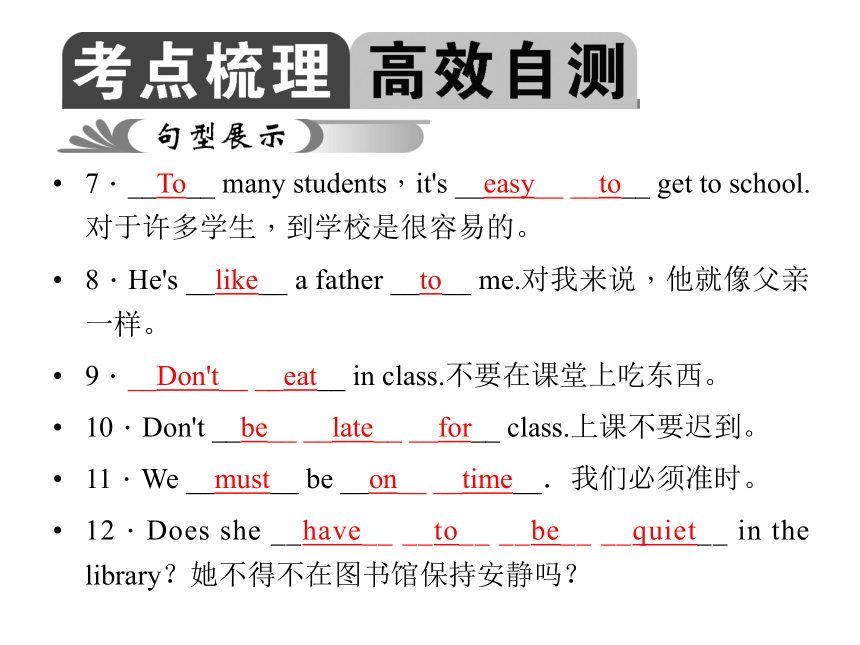
文档简介
课件59张PPT。英语第3讲 七年级(下)
Units 1-61.sing(v.)→__song__(n.)歌曲→__singer__(n.)歌手
2.speak(v.)→__spoke__(过去式)→__spoken__(过去分词)
3.write(v.)__wrote__(过去式)→__written__(过去分词)→__writer__(n.)作者
4.teach(v.)→__teacher__(n.)教师
5.up(adv.)→__down__(反义词)向下
6.tooth(n.)→__teeth__(复数)牙齿7.early(adj.)→__earlier__(比较级)→__earliest__(最高级)→__late__(反义词adj.)晚的
8.run(v.)→__runner__(n.)跑步者→__running__(现在分词)→__ran__(过去式)
9.new(adj.)→__old__(adj.反义词)旧的
10.many(adj.)→__more__(比较级)→__most__(最高级)
11.leave(v.)→__left__(过去式)
12.true(adj.)→__real__(adj.近义词)真的→__truth__(n.)事实;真相
13.noisy(adj.)→__quiet__(adj.反义词)安静的→__noise__(n.)噪音
14.luck(n.)→__lucky__(adj.)幸运的→__luckily__(adv.)幸运地15.beautiful(adj.)→__beauty__(n.)漂亮→__ugly__(反义词)
16.sleep(v.)→__asleep__(adj.)睡着的→__sleepy__(adj.)困倦的→__wake__(v.反义词)醒来
17.danger(n.)→__dangerous__(adj.)危险的→__safe__(adj.反义词)安全的
18.young(adj.)→__old__(adj.)年老的
19.child(n.)→__children__(复数)
20.dirty(adj.)→__clean__(adj.反义词)干净的
21.cross(v.)→__across__(adv.&prep.)过;穿过→__crossing__(n.)十字路口1.__speak__ English 说英语
2.__play__ __chess__ 下国际象棋
3.play __the__ __guitar__/__piano__ 弹吉他/钢琴
4.be __good__ __at__ 擅长
5.__tell__ __stories__ 讲故事
6.__swimming__ club 游泳俱乐部
7.__be__ __good__ __with__... 善于应付……的
8.__talk__ to 跟……说
9.__help__ (sb.)__with__ sth. 在某方面帮助(某人)
10.__on__ the __weekend__/on __weekends__ 在周末11.__make__ __friends__ 结交朋友
12.__get__ __up__ 起床
13.get __dressed__ 穿上衣服
14.__brush__ __teeth__ 刷牙
15.__take__ __a__ __shower__ 淋浴
16.__eat/have__ breakfast 吃早饭
17.__do__ one's homework 做作业
18.__take/have__ __a__ __walk__ 散步
19.__either__...__or__... 要么……要么……
20.__lots__ of 大量;许多21.__half__ __past__ six 六点半
22.__take__ the __subway__ 乘地铁
23.__ride__ a bike 骑自行车
24.__every__ __day__ 每天
25.__drive__ a car 开车
26.__think__ of 认为
27.__between__...and... 在……和……之间
28.be __afraid__ 害怕
29.__come__ __true__ 实现
30.(be) __on__ __time__ 准时31.__listen__ __to__ music 听音乐
32.__be__ __late__ __for__ class 上课迟到
33.__go__ __out__ 外出
34.__do/wash__ the __dishes__ 洗餐具
35.__make__ (one's) __bed__ 铺床
36.be __strict__ (with sb.) (对某人)要求严格
37.__follow__ the __rules__ 遵守规则
38.__kind__ __of__ 稍微;有点
39.__get__ __lost__ 迷路
40.be __in__ __great__ __danger__ 处于极大危险之中41.__cut__ __down__ 砍倒
42.(be) __made__ of... 由……制成的
43.__read__ a newspaper 看报纸
44.__make__ soup 做汤
45.go to the __movies__ 看电影
46.__eat__ __out__ 出去吃饭
47.__drink__ tea 喝茶
48.__wish__ __to__ __do__ sth. 希望做某事
49.__watch__ the boat races __on__ TV 在电视上看龙舟赛1.—__Can__ you swim?你会游泳吗?
—Yes,I __can__./No,I __can't__.是的,我会。/不,我不会。
2.—__What__ __can__ you __do__?你会做什么?
—I __can__ __dance__./I __can__ __sing__.我会跳舞。/我会唱歌。
3.—__What__ __club__ do you __want__ __to__ join?你想参加什么俱乐部?
—I want to join the __chess__ __club__.我想参加国际象棋俱乐部。4.__What__ __time__ do you __usually__ get up?你通常几点起床?
5.In the evening,I __either__ watch TV __or__ play computer games.晚上我要么看电视,要么玩电脑游戏。
6.—__How__ do you get to school?你怎样去上学?
—I usually __ride__ __my/a__ __bike__.我通常骑自行车。
—__How__ __long__ does it __take__ to get to school?到达学校要花多长时间?
—__It__ __takes__ about 20 minutes.大约20分钟。
—__How__ __far__ is it __from__ your home __to__ school?你家距学校有多远?
—It's about ten kilometers.大约10千米。7.__To__ many students,it's __easy__ __to__ get to school.对于许多学生,到学校是很容易的。
8.He's __like__ a father __to__ me.对我来说,他就像父亲一样。
9.__Don't__ __eat__ in class.不要在课堂上吃东西。
10.Don't __be__ __late__ __for__ class.上课不要迟到。
11.We __must__ be __on__ __time__.我们必须准时。
12.Does she __have__ __to__ __be__ __quiet__ in the library?她不得不在图书馆保持安静吗?13.There are __too__ __many__ rules!有太多的规定!
14.—__What__ __animals__ do you like?你喜欢什么动物?
—I like koalas.我喜欢树袋熊。
—__Why__ do you like them?你为什么喜欢它们?
—__Because__ they're __kind__ __of__ cute.因为它们有几分可爱。
—__Where__ __are__ they __from__?它们来自哪里?
—They're from Australia.它们来自澳大利亚。15.They can __walk__ __on__ two legs.它们会用两条腿走路。
16.—What __are__ you __doing__?你正在做什么?
—I __am__ __watching__ TV.我在看电视。
17.__What__ __time__ is it?现在几点了?
18.They're __talking__ __on__ __the__ __phone__.他们正在电话里交谈。
19.Do you __want__ __to__ join me __for__ dinner?你想和我一起吃晚餐吗? ?show
【典例在线】
What can you do in the school show?在学校表演会上你会做什么?
Please show me your photos you took in E'mei.请把你在峨眉山拍的照片给我看看。【拓展精析】
show名词,意为“展览”;动词,意为“出示”。
相关短语:
show sth.to sb./show sb.sth.把……展示给某人看
on show=on display展览
show sb.around...带领某人参观……
show up露面;出面
show off炫耀【活学活用】
1)—I want a ticket to Shanghai this afternoon,please.
—OK.Will you please __D__ me your ID card?(2012,泰安)
A.tell B.serve C.send D.show
2)—Could you please __B__ your ID card ______ me?
—Sure.(2014,滁州模拟)
A.take;to B.show;to
C.give;for D.show;for?make
【典例在线】
Can you make models?你会制作模型吗?
He made the baby cry just now.他刚才把这个婴儿弄哭了。
That made me very happy.那使我很高兴。【拓展精析】
①make作实义动词讲时,意为“做;制作”,后面可直接接名词或代词作宾语。
②make作使役动词讲时,意为“迫使;促使”,通常构成make sb.do sth.和make sb./sth.+adj.结构,这两个结构分别表示“使某人做某事”和“使某人/物处于某种状态”。
注意:make sb.do sth.结构在变被动语态时,要加上动词不定式符号to,即:sb.be made to do sth.。
【活学活用】
3)Li Jun always makes his little sister __C__.(2014,池州模拟)
A.crying B.to cry C.cry D.cried?stop
【典例在线】
The students stopped talking when the teacher came in.老师进来后学生们停止了谈论。
You look tired,please stop to have a rest.你看起来很累,停下来休息一下吧。
Nothing can stop us (from) reaching our aims.什么也阻止不了我们达到我们的目标。【拓展精析】
stop意为“停止”,常用结构如下:
stop doing sth.停止做(正在做的)某事
stop to do sth.停下来去做另外一件事
stop sb.(from) doing sth.=prevent sb.(from) doing sth.=keep sb.from doing sth.阻止某人做某事【活学活用】
4)A heavy rain made him stop __going__ (go) hiking in the mountains.He stopped __to_have__ (have) a rest in the small hotel.
5)—I feel tired and sleepy.
—Why not stop __B__ for a while?
A.rest B.to rest C.resting D.rested【活学活用】
1)—__B__ did you pay for the CD?
—Only nine dollars.(2014,黄山模拟)
A.How many B.How much
C.How long D.How often
2)—Jenny,I need some milk.(2013,铜陵模拟)
—OK.Mum.__A__ do you need?
A.How much B.How many
C.How often D.How long
?When is your birthday?你的生日是什么时候??remember
【典例在线】
I remember to post his letter.我记得要为他寄信。
I remember posting his letter.我记得为他寄过信。【拓展精析】
remember动词,意为“记住”,常用结构如下:
remember to do sth.记得去做某事(未做)
remember doing sth.记得做过某事(已做)
其反义词为forget,用法与remember类似,即forget to do sth.(忘记要做某事)和forget doing sth.(忘记做过某事)。
【活学活用】
6)Please remember __D__ your notebook here tomorrow.(2014,淮南模拟)
A.brings B.brought C.bringing D.to bring?leave
【典例在线】
He left (home) for the station a few minutes ago.几分钟前他(离开家)去车站了。
I left my bag under the tree.我把我的包落在树下了。
I have little money left.我几乎没剩下多少钱了。【拓展精析】
leave for+地点,动身去某地;前往某地
leave动词,留下;遗忘;剩下;离开
leave sth.sp.把某物忘在(落在)某地
have sth.left意为“剩下某物”。
注意:leaves可作leaf(树叶)的复数形式。
【活学活用】
7)—Show me your homework,Dave?(2013,襄阳)
—Sorry,Mrs.Brown.I've __D__ it at home.
A.missed B.forgotten C.lost D.left?keep
【典例在线】
I have to keep my hair short.我必须留短发。
Keep the child away from the fire.让孩子远离火。
How long can I keep the book?这本书我可以借多长时间?
Everyone should keep the rules.大家必须遵守规章制度。
Keep quiet,please.请保持安静。【拓展精析】
keep作及物动词,用于“keep+宾语+宾语补足语”结构,意为“使……保持某种状态”,其中宾语补足语通常由形容词、副词、介词短语等充当。
keep作及物动词还可意为“保存”,后接时间段时,代替borrow。
keep作及物动词,意为“遵守”,相当于follow。
keep作连系动词,后接形容词等作表语。
【活学活用】
8)Some of the tired students keep their eyes __C__ in breaks.(2014,马鞍山模拟)
A.opened B.close C.closed D.open?kind
【典例在线】
I'm kind of tired.我有点累了。
There're three kinds of apples on the table.桌子上有三种苹果。
The shop sells all kinds of fruits.这家商店出售各种各样的水果。
Our teacher is kind to us.我们老师对我们很好。
It's kind of you to help us.你帮助我们真是太好了。【拓展精析】
kind作名词,意为“种类;类型;类别”。常构成短语:a kind of...一种……;all kinds of...各种各样的……;different kinds of...不同种类的……
kind作形容词,意为“和蔼的;亲切的;善良的”。可用于句型It's kind of sb.to do sth.意为“某人做某事真是太好了。”
kind of意为“稍微;有点”,用来表示程度,修饰形容词或动词,相当于a little。【活学活用】
9)—Do you know that there are many different ________ animals in the zoo?
—Yes,I do.And I also know that some of them are __A__ scaring.(2014,宜城模拟)
A.kinds of;kind of B.kinds of;kinds of
C.kind of;kinds of D.kind of;kind of?Can you play the piano?你会弹钢琴吗?
【典例在线】
She often plays the guitar at home.她经常在家弹吉他。
Let's play basketball.让我们打篮球吧。
【拓展精析】
play意为“玩;打;弹奏”。当和西洋乐器类名词连用时,名词前必须加定冠词the;当和球类、棋牌类、游戏类名词连用时,名词前不能加任何冠词。【活学活用】
1)The young man in a blue coat is my PE teacher.He often plays __C__ basketball with us.(2014,邵阳)
A.the B.a
C./ D.an
?—Why do you like pandas?你为什么喜欢熊猫?
—Because they're very cute.因为他们很可爱。
【典例在线】
—Why do you like English?你为什么喜欢英语?
—Because it's interesting.因为它很有趣。
【拓展精析】
why疑问副词,意为“为什么”,相当于what...for,用来询问事情发生的原因,以why引导的特殊疑问句常用because来回答。2)—__A__ is the street crowded with so many people?(2014,合肥模拟)
—Because they are waiting to watch the boat races.
A.Why B.Where C.How D.Who?Parents and schools are sometimes strict,but remember,they make rules to help us.父母和学校有时是严格的,但是记住,他们制订规则是为了帮助我们。
【典例在线】
She is a strict teacher.她是一个严格的老师。
My parents are strict with me.我父母对我要求很严格。
Our teacher is strict in his work.我们的老师对他的工作要求严格。【拓展精析】
strict形容词,意为“严格的;严厉的”,在句中常用作表语、定语。常用短语:be strict with sb.对某人要求严格;be strict in sth.对某事要求严格。
【活学活用】
3)—What's your teacher like?
—She is always strict __B__ us.(2014,铜陵模拟)
A.in B.with C.to D.at?tell,speak,say,talk
【典例在线】
I didn't tell him about it yesterday.昨天我没有告诉他这件事。
He can speak Chinese.他会讲汉语。
“Happy birthday!”She said to me.“生日快乐!”她对我说。
I'm busy now.Don't talk to me.我现在很忙。不要和我说话。【拓展精析】
tell意为“告诉;讲述”,常用于tell sb.sth.或tell sth.to sb.结构,表示“告诉某人某事”。此外tell还常构成短语tell stories/jokes,意为“讲故事/笑话”。
speak意为“讲;说”,侧重于开口说话,后面常接表示“语言”的名词或代词。
say意为“说”,侧重说话的内容,后面通常接所说的话。
talk意为“谈话;谈论”,常与介词连用。talk to/with sb.表示“与某人交谈”。talk about sb./sth.表示“谈论某人/物”。【活学活用】
选词填空。(注意形式)
1)Kate saw a card on her table,it __said__,“Happy birthday!”
2)Please __speak__ more slowly.I can't hear you clearly.
3)He often __tells__ the children not to play in the street.
4)When I got home,my father __was_talking__ with his friend.?between,among
【典例在线】
The pay phone is between the park and the zoo.公用电话亭在公园与动物园之间。
Switzerland lies between France,Italy,Austria and Germany.瑞士位于法国、意大利、奥地利和德国之间。
They hid themselves among the trees.他们躲在树林之中。【拓展精析】
between通常用于两者之间,between...and...意为“在……和……之间”,后跟代词时用人称代词的宾格形式;among用于三者或三者以上,意思是“在……当中”。但是表达三者或三者以上的人或事物中两两之间的关系时,仍用between。【活学活用】
5)His grade in the exam put him __C__ the top students in his class.(2014,六安模拟)
A.between B.over C.among D.above
6)The accident happened ________ 7 p.m.__D__ 9 p.m.(2014,安庆模拟)
A.from;to B.between;to
C.from;and D.between;and?put on,wear,dress,be in
【典例在线】
I don't wear glasses.我不戴眼镜。
He put on his coat and went out.他穿上外套出去了。
The girl in red is my sister.穿红衣服的女孩是我妹妹。
The little girl can dress herself.这个小女孩可以自己穿衣服了。【拓展精析】
wear可用于穿衣、穿鞋、戴帽子、戴手套、佩戴首饰等,强调状态。
put on表示穿的动作,其反义词组是take off。
“be in+表示颜色或衣服的词”,强调“穿着;戴着”的状态。
dress既可以表示动作,也可以表示状态。
表示动作时常用短语:dress sb.给某人穿衣服;dress oneself (get dressed)自己穿衣服。
表示状态时常用be dressed in。【活学活用】
7)Jenny,__put_on__ your sweater,or you will catch a cold.
8)He is a boy of four.He can't __dress__ himself.
9)The girl often __wears__ a white skirt.
10)Do you know the woman __in__ red?
11)She often __wears__ a pair of glasses.?arrive,reach,get to
【典例在线】
We arrived in Beijing this morning.我们今天早上到达了北京。
They arrived at the small village last night.他们昨晚到达了这个小村庄。
Lisa reached her home very late last night.莉萨昨天晚上很晚才到家。
What time do you get to school every morning?你每天早上几点到校?
We arrived/got/reached here last night.我们是昨晚到达这里的。【拓展精析】
arrive是不及物动词,后加介词in接较大的地方,后加介词at接较小的地方。
reach是及物动词,后可直接接地点。
get是不及物动词,其后接介词to之后才能和表示地点的名词连用。
注意:当arrive,get后接地点副词home,there,here时,不接任何介词。【活学活用】
12)—I wonder when you ________ in New York.
—I will send an e-mail to you as soon as I __B__ there.(2014,池州模拟)
A.arrive;will get B.will arrive;get
C.will arrive;will get D.arrive;get?sleeping,asleep,sleepy
【典例在线】
Mr.Li is sleeping,please call him later.李先生正在睡觉,请稍后再打电话给他。
The children are asleep now.现在孩子们睡着了。
On Friday afternoons,many students are sleepy after a long week of classes.经过长长一周的课程后,很多学生在星期五下午都是困倦的。【拓展精析】
be sleeping表示动作,意为“正在睡觉”,不确定是否睡着。
be asleep表示状态,意为“睡着了”。fall asleep意为“入睡”,表瞬间动作。
sleepy形容词, 意为“困倦的”。
【活学活用】
13)Don't make noise,the baby __is___ __sleeping__.
14)He was so tired that he fell __asleep__ at once.
15)Because he stayed up to watch the football match,he felt __sleepy__ during the next day.?other,the other,others,the others,another
【典例在线】
Do you have other questions?你还有其他问题吗?
I have two pens.One is red,the other is black.我有两支钢笔,一支是红色的,另一支是黑色的。
Some are dancing,others are singing.一些人在跳舞,另一些人在唱歌。
There are forty students in our class.Twenty-eight of us are boys,the others are girls.我们班有40名同学。28名是男孩,其余的是女孩。
I don't like this one.Please show me another.我不喜欢这一个。请让我看看另一个。
Tom runs faster than any other boy in his class.汤姆比他班上的其他任何一个男孩跑得都快。【拓展精析】
other可作形容词或代词,作形容词时意为“别的;其他的”,泛指“其他的(人或物)”。
the other意为“另一个”,常用于两个人或物中的另一个。常用结构为one...the other...,意为“一个……,另一个……”。
others是other的复数形式,泛指“其余的(人或东西)”,但并非全部。用作代词,在句中作主语或宾语。常用结构为some...others...,意为“一些……,另一些……”。
the others意为“其他东西;其余的人”,特指某一范围内的“其他的(所有人或物)”,指全体中除去一部分后剩余的全部,相当于the rest,是the other的复数形式。
another既可作形容词,也可作代词,只能用于出现三个或者更多的人或物时,泛指同类事物中的三者或三者以上的“另一个”,只能代替或修饰单数可数名词。
注意:any other意为“其他任何一个;任何其他的……”,是指在同一范围内除了某人或某物外的其他人或事物,其后接单数名词。【活学活用】
16)My family has two dogs.One is white,__C__ is black.(2014,淮北模拟)
A.other B.another C.the other D.others
17)—Could we see each other at 9 o'clock tomorrow morning?(2014,淮南模拟)
—Sorry,let's make it __C__ time.
A.other's B.the other C.another D.other?either...or...,neither...nor...,both...and...,not only...but also...
【典例在线】
Either you or your brother plays computer games.要么你要么你的弟弟玩电脑游戏。
I have neither brothers nor sisters.我既没有兄弟也没有姐妹。
Both Tom and Jim are good at drawing.汤姆和吉姆两个人都擅长画画。
The girl is not only pretty but (also) clever.这个女孩不但漂亮,而且很聪明。【拓展精析】
①either...or...意为“或者……或者……;要么……要么……”,连接并列的句子成分。当连接并列主语时,谓语动词遵循就近原则。
②neither...nor...意为“既不……也不……”,连接并列的句子成分。当连接并列主语时,谓语动词遵循就近原则。
③both...and...意为“……与……两者都”,连接并列的句子成分。当连接主语时,谓语动词用复数形式。
④not only...but also...意为“不但……而且……”,连接并列的句子成分。当连接并列主语时,谓语动词遵循就近原则。【活学活用】
18)—Where are you going to stay when you get to Shanghai?
—I may live ________ in a hotel __B__ in a friend's house.(2014,呼和浩特)
A.both;and B.either;or
C.neither;nor D.not only;but also
19)—Neither Tony nor I __A__ interested in playing Weibo.
—You are out.(2014,宣城模拟)
A.am B.is C.are D.was请完成考点跟踪突破3
Units 1-61.sing(v.)→__song__(n.)歌曲→__singer__(n.)歌手
2.speak(v.)→__spoke__(过去式)→__spoken__(过去分词)
3.write(v.)__wrote__(过去式)→__written__(过去分词)→__writer__(n.)作者
4.teach(v.)→__teacher__(n.)教师
5.up(adv.)→__down__(反义词)向下
6.tooth(n.)→__teeth__(复数)牙齿7.early(adj.)→__earlier__(比较级)→__earliest__(最高级)→__late__(反义词adj.)晚的
8.run(v.)→__runner__(n.)跑步者→__running__(现在分词)→__ran__(过去式)
9.new(adj.)→__old__(adj.反义词)旧的
10.many(adj.)→__more__(比较级)→__most__(最高级)
11.leave(v.)→__left__(过去式)
12.true(adj.)→__real__(adj.近义词)真的→__truth__(n.)事实;真相
13.noisy(adj.)→__quiet__(adj.反义词)安静的→__noise__(n.)噪音
14.luck(n.)→__lucky__(adj.)幸运的→__luckily__(adv.)幸运地15.beautiful(adj.)→__beauty__(n.)漂亮→__ugly__(反义词)
16.sleep(v.)→__asleep__(adj.)睡着的→__sleepy__(adj.)困倦的→__wake__(v.反义词)醒来
17.danger(n.)→__dangerous__(adj.)危险的→__safe__(adj.反义词)安全的
18.young(adj.)→__old__(adj.)年老的
19.child(n.)→__children__(复数)
20.dirty(adj.)→__clean__(adj.反义词)干净的
21.cross(v.)→__across__(adv.&prep.)过;穿过→__crossing__(n.)十字路口1.__speak__ English 说英语
2.__play__ __chess__ 下国际象棋
3.play __the__ __guitar__/__piano__ 弹吉他/钢琴
4.be __good__ __at__ 擅长
5.__tell__ __stories__ 讲故事
6.__swimming__ club 游泳俱乐部
7.__be__ __good__ __with__... 善于应付……的
8.__talk__ to 跟……说
9.__help__ (sb.)__with__ sth. 在某方面帮助(某人)
10.__on__ the __weekend__/on __weekends__ 在周末11.__make__ __friends__ 结交朋友
12.__get__ __up__ 起床
13.get __dressed__ 穿上衣服
14.__brush__ __teeth__ 刷牙
15.__take__ __a__ __shower__ 淋浴
16.__eat/have__ breakfast 吃早饭
17.__do__ one's homework 做作业
18.__take/have__ __a__ __walk__ 散步
19.__either__...__or__... 要么……要么……
20.__lots__ of 大量;许多21.__half__ __past__ six 六点半
22.__take__ the __subway__ 乘地铁
23.__ride__ a bike 骑自行车
24.__every__ __day__ 每天
25.__drive__ a car 开车
26.__think__ of 认为
27.__between__...and... 在……和……之间
28.be __afraid__ 害怕
29.__come__ __true__ 实现
30.(be) __on__ __time__ 准时31.__listen__ __to__ music 听音乐
32.__be__ __late__ __for__ class 上课迟到
33.__go__ __out__ 外出
34.__do/wash__ the __dishes__ 洗餐具
35.__make__ (one's) __bed__ 铺床
36.be __strict__ (with sb.) (对某人)要求严格
37.__follow__ the __rules__ 遵守规则
38.__kind__ __of__ 稍微;有点
39.__get__ __lost__ 迷路
40.be __in__ __great__ __danger__ 处于极大危险之中41.__cut__ __down__ 砍倒
42.(be) __made__ of... 由……制成的
43.__read__ a newspaper 看报纸
44.__make__ soup 做汤
45.go to the __movies__ 看电影
46.__eat__ __out__ 出去吃饭
47.__drink__ tea 喝茶
48.__wish__ __to__ __do__ sth. 希望做某事
49.__watch__ the boat races __on__ TV 在电视上看龙舟赛1.—__Can__ you swim?你会游泳吗?
—Yes,I __can__./No,I __can't__.是的,我会。/不,我不会。
2.—__What__ __can__ you __do__?你会做什么?
—I __can__ __dance__./I __can__ __sing__.我会跳舞。/我会唱歌。
3.—__What__ __club__ do you __want__ __to__ join?你想参加什么俱乐部?
—I want to join the __chess__ __club__.我想参加国际象棋俱乐部。4.__What__ __time__ do you __usually__ get up?你通常几点起床?
5.In the evening,I __either__ watch TV __or__ play computer games.晚上我要么看电视,要么玩电脑游戏。
6.—__How__ do you get to school?你怎样去上学?
—I usually __ride__ __my/a__ __bike__.我通常骑自行车。
—__How__ __long__ does it __take__ to get to school?到达学校要花多长时间?
—__It__ __takes__ about 20 minutes.大约20分钟。
—__How__ __far__ is it __from__ your home __to__ school?你家距学校有多远?
—It's about ten kilometers.大约10千米。7.__To__ many students,it's __easy__ __to__ get to school.对于许多学生,到学校是很容易的。
8.He's __like__ a father __to__ me.对我来说,他就像父亲一样。
9.__Don't__ __eat__ in class.不要在课堂上吃东西。
10.Don't __be__ __late__ __for__ class.上课不要迟到。
11.We __must__ be __on__ __time__.我们必须准时。
12.Does she __have__ __to__ __be__ __quiet__ in the library?她不得不在图书馆保持安静吗?13.There are __too__ __many__ rules!有太多的规定!
14.—__What__ __animals__ do you like?你喜欢什么动物?
—I like koalas.我喜欢树袋熊。
—__Why__ do you like them?你为什么喜欢它们?
—__Because__ they're __kind__ __of__ cute.因为它们有几分可爱。
—__Where__ __are__ they __from__?它们来自哪里?
—They're from Australia.它们来自澳大利亚。15.They can __walk__ __on__ two legs.它们会用两条腿走路。
16.—What __are__ you __doing__?你正在做什么?
—I __am__ __watching__ TV.我在看电视。
17.__What__ __time__ is it?现在几点了?
18.They're __talking__ __on__ __the__ __phone__.他们正在电话里交谈。
19.Do you __want__ __to__ join me __for__ dinner?你想和我一起吃晚餐吗? ?show
【典例在线】
What can you do in the school show?在学校表演会上你会做什么?
Please show me your photos you took in E'mei.请把你在峨眉山拍的照片给我看看。【拓展精析】
show名词,意为“展览”;动词,意为“出示”。
相关短语:
show sth.to sb./show sb.sth.把……展示给某人看
on show=on display展览
show sb.around...带领某人参观……
show up露面;出面
show off炫耀【活学活用】
1)—I want a ticket to Shanghai this afternoon,please.
—OK.Will you please __D__ me your ID card?(2012,泰安)
A.tell B.serve C.send D.show
2)—Could you please __B__ your ID card ______ me?
—Sure.(2014,滁州模拟)
A.take;to B.show;to
C.give;for D.show;for?make
【典例在线】
Can you make models?你会制作模型吗?
He made the baby cry just now.他刚才把这个婴儿弄哭了。
That made me very happy.那使我很高兴。【拓展精析】
①make作实义动词讲时,意为“做;制作”,后面可直接接名词或代词作宾语。
②make作使役动词讲时,意为“迫使;促使”,通常构成make sb.do sth.和make sb./sth.+adj.结构,这两个结构分别表示“使某人做某事”和“使某人/物处于某种状态”。
注意:make sb.do sth.结构在变被动语态时,要加上动词不定式符号to,即:sb.be made to do sth.。
【活学活用】
3)Li Jun always makes his little sister __C__.(2014,池州模拟)
A.crying B.to cry C.cry D.cried?stop
【典例在线】
The students stopped talking when the teacher came in.老师进来后学生们停止了谈论。
You look tired,please stop to have a rest.你看起来很累,停下来休息一下吧。
Nothing can stop us (from) reaching our aims.什么也阻止不了我们达到我们的目标。【拓展精析】
stop意为“停止”,常用结构如下:
stop doing sth.停止做(正在做的)某事
stop to do sth.停下来去做另外一件事
stop sb.(from) doing sth.=prevent sb.(from) doing sth.=keep sb.from doing sth.阻止某人做某事【活学活用】
4)A heavy rain made him stop __going__ (go) hiking in the mountains.He stopped __to_have__ (have) a rest in the small hotel.
5)—I feel tired and sleepy.
—Why not stop __B__ for a while?
A.rest B.to rest C.resting D.rested【活学活用】
1)—__B__ did you pay for the CD?
—Only nine dollars.(2014,黄山模拟)
A.How many B.How much
C.How long D.How often
2)—Jenny,I need some milk.(2013,铜陵模拟)
—OK.Mum.__A__ do you need?
A.How much B.How many
C.How often D.How long
?When is your birthday?你的生日是什么时候??remember
【典例在线】
I remember to post his letter.我记得要为他寄信。
I remember posting his letter.我记得为他寄过信。【拓展精析】
remember动词,意为“记住”,常用结构如下:
remember to do sth.记得去做某事(未做)
remember doing sth.记得做过某事(已做)
其反义词为forget,用法与remember类似,即forget to do sth.(忘记要做某事)和forget doing sth.(忘记做过某事)。
【活学活用】
6)Please remember __D__ your notebook here tomorrow.(2014,淮南模拟)
A.brings B.brought C.bringing D.to bring?leave
【典例在线】
He left (home) for the station a few minutes ago.几分钟前他(离开家)去车站了。
I left my bag under the tree.我把我的包落在树下了。
I have little money left.我几乎没剩下多少钱了。【拓展精析】
leave for+地点,动身去某地;前往某地
leave动词,留下;遗忘;剩下;离开
leave sth.sp.把某物忘在(落在)某地
have sth.left意为“剩下某物”。
注意:leaves可作leaf(树叶)的复数形式。
【活学活用】
7)—Show me your homework,Dave?(2013,襄阳)
—Sorry,Mrs.Brown.I've __D__ it at home.
A.missed B.forgotten C.lost D.left?keep
【典例在线】
I have to keep my hair short.我必须留短发。
Keep the child away from the fire.让孩子远离火。
How long can I keep the book?这本书我可以借多长时间?
Everyone should keep the rules.大家必须遵守规章制度。
Keep quiet,please.请保持安静。【拓展精析】
keep作及物动词,用于“keep+宾语+宾语补足语”结构,意为“使……保持某种状态”,其中宾语补足语通常由形容词、副词、介词短语等充当。
keep作及物动词还可意为“保存”,后接时间段时,代替borrow。
keep作及物动词,意为“遵守”,相当于follow。
keep作连系动词,后接形容词等作表语。
【活学活用】
8)Some of the tired students keep their eyes __C__ in breaks.(2014,马鞍山模拟)
A.opened B.close C.closed D.open?kind
【典例在线】
I'm kind of tired.我有点累了。
There're three kinds of apples on the table.桌子上有三种苹果。
The shop sells all kinds of fruits.这家商店出售各种各样的水果。
Our teacher is kind to us.我们老师对我们很好。
It's kind of you to help us.你帮助我们真是太好了。【拓展精析】
kind作名词,意为“种类;类型;类别”。常构成短语:a kind of...一种……;all kinds of...各种各样的……;different kinds of...不同种类的……
kind作形容词,意为“和蔼的;亲切的;善良的”。可用于句型It's kind of sb.to do sth.意为“某人做某事真是太好了。”
kind of意为“稍微;有点”,用来表示程度,修饰形容词或动词,相当于a little。【活学活用】
9)—Do you know that there are many different ________ animals in the zoo?
—Yes,I do.And I also know that some of them are __A__ scaring.(2014,宜城模拟)
A.kinds of;kind of B.kinds of;kinds of
C.kind of;kinds of D.kind of;kind of?Can you play the piano?你会弹钢琴吗?
【典例在线】
She often plays the guitar at home.她经常在家弹吉他。
Let's play basketball.让我们打篮球吧。
【拓展精析】
play意为“玩;打;弹奏”。当和西洋乐器类名词连用时,名词前必须加定冠词the;当和球类、棋牌类、游戏类名词连用时,名词前不能加任何冠词。【活学活用】
1)The young man in a blue coat is my PE teacher.He often plays __C__ basketball with us.(2014,邵阳)
A.the B.a
C./ D.an
?—Why do you like pandas?你为什么喜欢熊猫?
—Because they're very cute.因为他们很可爱。
【典例在线】
—Why do you like English?你为什么喜欢英语?
—Because it's interesting.因为它很有趣。
【拓展精析】
why疑问副词,意为“为什么”,相当于what...for,用来询问事情发生的原因,以why引导的特殊疑问句常用because来回答。2)—__A__ is the street crowded with so many people?(2014,合肥模拟)
—Because they are waiting to watch the boat races.
A.Why B.Where C.How D.Who?Parents and schools are sometimes strict,but remember,they make rules to help us.父母和学校有时是严格的,但是记住,他们制订规则是为了帮助我们。
【典例在线】
She is a strict teacher.她是一个严格的老师。
My parents are strict with me.我父母对我要求很严格。
Our teacher is strict in his work.我们的老师对他的工作要求严格。【拓展精析】
strict形容词,意为“严格的;严厉的”,在句中常用作表语、定语。常用短语:be strict with sb.对某人要求严格;be strict in sth.对某事要求严格。
【活学活用】
3)—What's your teacher like?
—She is always strict __B__ us.(2014,铜陵模拟)
A.in B.with C.to D.at?tell,speak,say,talk
【典例在线】
I didn't tell him about it yesterday.昨天我没有告诉他这件事。
He can speak Chinese.他会讲汉语。
“Happy birthday!”She said to me.“生日快乐!”她对我说。
I'm busy now.Don't talk to me.我现在很忙。不要和我说话。【拓展精析】
tell意为“告诉;讲述”,常用于tell sb.sth.或tell sth.to sb.结构,表示“告诉某人某事”。此外tell还常构成短语tell stories/jokes,意为“讲故事/笑话”。
speak意为“讲;说”,侧重于开口说话,后面常接表示“语言”的名词或代词。
say意为“说”,侧重说话的内容,后面通常接所说的话。
talk意为“谈话;谈论”,常与介词连用。talk to/with sb.表示“与某人交谈”。talk about sb./sth.表示“谈论某人/物”。【活学活用】
选词填空。(注意形式)
1)Kate saw a card on her table,it __said__,“Happy birthday!”
2)Please __speak__ more slowly.I can't hear you clearly.
3)He often __tells__ the children not to play in the street.
4)When I got home,my father __was_talking__ with his friend.?between,among
【典例在线】
The pay phone is between the park and the zoo.公用电话亭在公园与动物园之间。
Switzerland lies between France,Italy,Austria and Germany.瑞士位于法国、意大利、奥地利和德国之间。
They hid themselves among the trees.他们躲在树林之中。【拓展精析】
between通常用于两者之间,between...and...意为“在……和……之间”,后跟代词时用人称代词的宾格形式;among用于三者或三者以上,意思是“在……当中”。但是表达三者或三者以上的人或事物中两两之间的关系时,仍用between。【活学活用】
5)His grade in the exam put him __C__ the top students in his class.(2014,六安模拟)
A.between B.over C.among D.above
6)The accident happened ________ 7 p.m.__D__ 9 p.m.(2014,安庆模拟)
A.from;to B.between;to
C.from;and D.between;and?put on,wear,dress,be in
【典例在线】
I don't wear glasses.我不戴眼镜。
He put on his coat and went out.他穿上外套出去了。
The girl in red is my sister.穿红衣服的女孩是我妹妹。
The little girl can dress herself.这个小女孩可以自己穿衣服了。【拓展精析】
wear可用于穿衣、穿鞋、戴帽子、戴手套、佩戴首饰等,强调状态。
put on表示穿的动作,其反义词组是take off。
“be in+表示颜色或衣服的词”,强调“穿着;戴着”的状态。
dress既可以表示动作,也可以表示状态。
表示动作时常用短语:dress sb.给某人穿衣服;dress oneself (get dressed)自己穿衣服。
表示状态时常用be dressed in。【活学活用】
7)Jenny,__put_on__ your sweater,or you will catch a cold.
8)He is a boy of four.He can't __dress__ himself.
9)The girl often __wears__ a white skirt.
10)Do you know the woman __in__ red?
11)She often __wears__ a pair of glasses.?arrive,reach,get to
【典例在线】
We arrived in Beijing this morning.我们今天早上到达了北京。
They arrived at the small village last night.他们昨晚到达了这个小村庄。
Lisa reached her home very late last night.莉萨昨天晚上很晚才到家。
What time do you get to school every morning?你每天早上几点到校?
We arrived/got/reached here last night.我们是昨晚到达这里的。【拓展精析】
arrive是不及物动词,后加介词in接较大的地方,后加介词at接较小的地方。
reach是及物动词,后可直接接地点。
get是不及物动词,其后接介词to之后才能和表示地点的名词连用。
注意:当arrive,get后接地点副词home,there,here时,不接任何介词。【活学活用】
12)—I wonder when you ________ in New York.
—I will send an e-mail to you as soon as I __B__ there.(2014,池州模拟)
A.arrive;will get B.will arrive;get
C.will arrive;will get D.arrive;get?sleeping,asleep,sleepy
【典例在线】
Mr.Li is sleeping,please call him later.李先生正在睡觉,请稍后再打电话给他。
The children are asleep now.现在孩子们睡着了。
On Friday afternoons,many students are sleepy after a long week of classes.经过长长一周的课程后,很多学生在星期五下午都是困倦的。【拓展精析】
be sleeping表示动作,意为“正在睡觉”,不确定是否睡着。
be asleep表示状态,意为“睡着了”。fall asleep意为“入睡”,表瞬间动作。
sleepy形容词, 意为“困倦的”。
【活学活用】
13)Don't make noise,the baby __is___ __sleeping__.
14)He was so tired that he fell __asleep__ at once.
15)Because he stayed up to watch the football match,he felt __sleepy__ during the next day.?other,the other,others,the others,another
【典例在线】
Do you have other questions?你还有其他问题吗?
I have two pens.One is red,the other is black.我有两支钢笔,一支是红色的,另一支是黑色的。
Some are dancing,others are singing.一些人在跳舞,另一些人在唱歌。
There are forty students in our class.Twenty-eight of us are boys,the others are girls.我们班有40名同学。28名是男孩,其余的是女孩。
I don't like this one.Please show me another.我不喜欢这一个。请让我看看另一个。
Tom runs faster than any other boy in his class.汤姆比他班上的其他任何一个男孩跑得都快。【拓展精析】
other可作形容词或代词,作形容词时意为“别的;其他的”,泛指“其他的(人或物)”。
the other意为“另一个”,常用于两个人或物中的另一个。常用结构为one...the other...,意为“一个……,另一个……”。
others是other的复数形式,泛指“其余的(人或东西)”,但并非全部。用作代词,在句中作主语或宾语。常用结构为some...others...,意为“一些……,另一些……”。
the others意为“其他东西;其余的人”,特指某一范围内的“其他的(所有人或物)”,指全体中除去一部分后剩余的全部,相当于the rest,是the other的复数形式。
another既可作形容词,也可作代词,只能用于出现三个或者更多的人或物时,泛指同类事物中的三者或三者以上的“另一个”,只能代替或修饰单数可数名词。
注意:any other意为“其他任何一个;任何其他的……”,是指在同一范围内除了某人或某物外的其他人或事物,其后接单数名词。【活学活用】
16)My family has two dogs.One is white,__C__ is black.(2014,淮北模拟)
A.other B.another C.the other D.others
17)—Could we see each other at 9 o'clock tomorrow morning?(2014,淮南模拟)
—Sorry,let's make it __C__ time.
A.other's B.the other C.another D.other?either...or...,neither...nor...,both...and...,not only...but also...
【典例在线】
Either you or your brother plays computer games.要么你要么你的弟弟玩电脑游戏。
I have neither brothers nor sisters.我既没有兄弟也没有姐妹。
Both Tom and Jim are good at drawing.汤姆和吉姆两个人都擅长画画。
The girl is not only pretty but (also) clever.这个女孩不但漂亮,而且很聪明。【拓展精析】
①either...or...意为“或者……或者……;要么……要么……”,连接并列的句子成分。当连接并列主语时,谓语动词遵循就近原则。
②neither...nor...意为“既不……也不……”,连接并列的句子成分。当连接并列主语时,谓语动词遵循就近原则。
③both...and...意为“……与……两者都”,连接并列的句子成分。当连接主语时,谓语动词用复数形式。
④not only...but also...意为“不但……而且……”,连接并列的句子成分。当连接并列主语时,谓语动词遵循就近原则。【活学活用】
18)—Where are you going to stay when you get to Shanghai?
—I may live ________ in a hotel __B__ in a friend's house.(2014,呼和浩特)
A.both;and B.either;or
C.neither;nor D.not only;but also
19)—Neither Tony nor I __A__ interested in playing Weibo.
—You are out.(2014,宣城模拟)
A.am B.is C.are D.was请完成考点跟踪突破3
